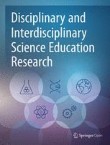Edited by: Joseph S. Krajcik, Rui Wei and Lei Wang
The Journal of Disciplinary and Interdisciplinary Science Education Research (DISER) announces a special issue on designing, developing and teaching project-based learning (PBL) to promote disciplinary and interdisciplinary science education. Globally, PBL has gained prominence as a potential instructional perspective to support learners in developing deeper and more usable knowledge as well as promote learners social and emotional learning. Project-based learning with its roots grounded in the philosophy of John Dewey is based on several theoretical ideas: (1) active construction, (2) situated learning, (3) social interactions, and (4) cognitive tools (Krajcik & Shin, 2014; Miller & Krajcik, 2019). With its focus on students investigating questions that they find meaningful, PBL has the potential to transform classrooms into learning environments where students solve worthwhile problems and collaborate to construct shared knowledge. In PBL, driving questions guide students’ exploration, create wonder, and sustain engagement. PBL environments culminate with students developing artifacts that provide insights into what students have learned. Although much has been learned about the design, development and testing of PBL in the last 25 years, the use of PBL to promote deeper and more useable knowledge to solve challenging problems has gained greater attention. However, challenges exist in developing teaching and learning materials, scaling and sustaining PBL environments, and assessing learning in these environments throughout K- 12 and post-secondary science education.
DISER invites scholars to submit a wide range of manuscripts on PBL, including empirical, theoretical and policy studies to promote how to support all learners to develop deeper and more useable knowledge in science. The criteria for selection will depend on new contributions to the literature on PBL and how the research moves the field forward to promote and sustain deep and useable student learning.
The Journal of Disciplinary and Interdisciplinary Science Education Research (DISER) promotes scholarship in education within and across science disciplines. DISER publishes original empirical, conceptual and policy studies reflecting the latest developments in science education from disciplinary and interdisciplinary perspectives. DISER bridges the divide and facilitates dialogue between formal and informal, disciplinary and interdisciplinary, K-12 and post-secondary, as well as English-speaking and non-English speaking country science education.
Selection Process
Scholars interested in the special issue should submit a five-page proposal by July 1st, 2020 with full manuscripts due by October 15th. The guest editors, Professor Joe Krajcik from Michigan State University and the CREATE for STEM Institute, and Professors Lei Wang and Wei Rui from Beijing Normal University, as well as members from the DISER editorial board will review proposals. The editorial team for the special issue will select five to six proposals to develop into full papers.
Authors selected to develop full papers will present their papers at the International Forum for Science Education sponsored by the International Institute on Science Education Research at Beijing Normal University in Winter or Spring 2021. The invited presenters (typically the first authors) will receive international travel and accommodation covered by Beijing Normal University.
Publication Timelines
- Proposals Submission Deadline: July 1st, 2020
- Notification of accepted manuscripts: August 1th, 2020
- Full manuscripts submitted for reviews: October 15th, 2020
- First revisions due: December 2020
- Second revisions due: February 2021
- Expected publication: April 2021
- Presentations of Manuscripts at BNU’s International Forum on Science Education
Submission Guidelines:
Proposals should be submitted to diserconnection@gmail.com and accompanied by a cover letter indicating that the manuscript is a “Special Issue” submission. Authors must follow DISER manuscript guidelines (see: https://diser.springeropen.com/submission-guidelines).
Inquiries concerning the suitability of possible contributions to this special issue should be sent by email directly to:
Lead Guest Editor
Joseph S. Krajcik
CREATE for STEM
College of Education
Michigan State University
115 Erickson Hall
East Lansing, MI 48824
U.S.A.
krajcik@msu.edu
Guest Editors
Lei Wang
Beijing Normal University
China
Rui Wei
Beijing Normal University
China
References
Miller, E. C., & Krajcik, J. S. (2019). Promoting deep learning through project-based learning: a design problem. Disciplinary and Interdisciplinary Science Education Research, 1(1), 1-10.
Krajcik, J. S., & Shin, N. (2014). Project-based learning. In R. K. Sawyer (Ed.), The Cambridge handbook of learning sciences, (2nd ed.), New York: Cambridge.
